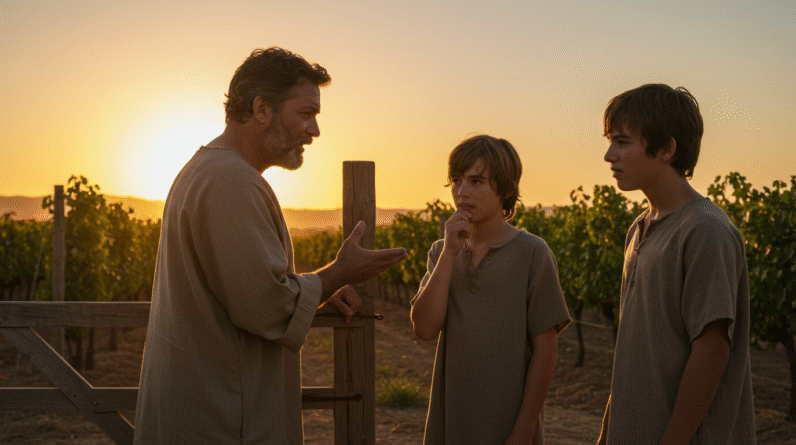Discover the Parable of the Ten Virgins meaning and learn its powerful lesson about readiness, faith, and the coming of the Kingdom of God.
Table of Contents
ToggleParable of the Ten Virgins Meaning – Matthew 25:1-13
The Parable of the Ten Virgins is one of those stories you might have heard in Sunday School but never quite fully dissected. It’s a parable that comes to life in Matthew 25:1-13, and brings with it a wealth of wisdom and a timely reminder for today’s world. If you’ve ever been curious about what this parable means and how it could apply to your life, you’re in the right place.
Understanding the Setting
Before diving into the parable’s meaning, it’s essential to get a sense of the setting. Picture a wedding from a different era, perhaps the dusty streets of a small town, where excitement hangs in the air as day transitions to night.
In biblical times, a wedding was not just about two people committing to one another but a community affair that could last for days. The friends of the bride, known as virgins in this parable, had the important role of welcoming the bridegroom into the ceremony. This backdrop adds cultural richness and stakes to what is being told.
Introduction to the Parable
The Ten Virgins
Matthew 25:1-13 introduces us to the ten virgins, a term that can be interchanged with bridesmaids in today’s context. Five are described as wise, and five as foolish. Their primary role is to meet the bridegroom with lamps in hand, ready to illuminate the festive path (Matthew 25:1-2).
Lamps and Oil: Symbols and Meanings
The lamps and oil serve as significant symbols within this narrative. A lamp without oil is useless, just as faith without preparation or diligence can falter. The wise virgins bring extra oil along with their lamps, a precaution or foresight that the foolish virgins fail to take (Matthew 25:3-4). Understanding these elements sets the stage for the message encapsulated in this tale.
The Cry at Midnight
An Unexpected Arrival
The parable takes an unexpected twist when the bridegroom’s approach is delayed, causing all the virgins to fall asleep. At midnight, a cry announces the bridegroom’s arrival, awakening everyone with a sudden urgency (Matthew 25:5-6).
The Need for Readiness
This moment emphasizes the essential theme of readiness. The wise virgins prepare by bringing along oil, ready for any delays, while the foolish realize their lack of preparation too late (Matthew 25:7-9). The lesson here is clear: it’s critical to be prepared for things that are uncertain or unexpected in life.
The Door is Shut
A Missed Opportunity
As the narrative unfolds, the foolish virgins are left scrambling, running to buy oil. By the time they return, the door to the wedding banquet is shut, and they are left outside, unrecognized by the bridegroom (Matthew 25:10-12).
Finality and the Weight of Time
This closing scene brings a sense of finality, heavy with the weight of missed opportunities. The parable communicates the importance of constant preparedness and vigilance, not just in small aspects of life but in our spiritual journey as a whole.

What Does This Mean for You Today?
Life’s Unexpected Timing
The teachings in this parable are timeless, providing lessons still applicable today. Life is unpredictable, filled with moments that require us to be ready and flexible. Whether that’s in our faith, our careers, or our relationships, the value of being prepared cannot be overstated.
Spiritual Readiness
Spiritually, it could mean keeping your faith vibrant and active, rather than passive and neglected. Being like the wise virgins is about maintaining a faith that has depth and substance, equipped to withstand delays and trials.
Personal Reflections
Ask yourself, are you ready for the unexpected? In what areas could you be more like the wise virgins, foreseeing needs and challenges before they occur? This parable isn’t just about a wedding; it’s a broader call to action for preparedness in all facets of life.
Parables as Mirrors
The Parable of the Ten Virgins gently holds a mirror to our lives, urging us to introspect and assess where we stand. Are we wise or foolish, prepared or unprepared? It’s not so much about judgment as it is about awakening and inspiring change. This story highlights the importance of vigilance, faith, and the power of anticipation. It’s a call to sharpen our spiritual tools and be ever vigilant about means unknown.
Conclusion
Ultimately, the Parable of the Ten Virgins serves as both a beacon and a warning. The message is crystal clear: always be prepared. Whether that’s spiritually, professionally, or in everyday situations, make sure your lamp has enough oil. Remember, it’s the choices we make now, in simple or quiet moments of preparation, that can determine how we fare when those midnight cries break the silence.

🔍 Explore More Bible Insights:
✅ 1. The Role of Eliab – David’s Brother in His Journey to Facing Goliath
Tone: Relational, reflective, character-focused
🔹 “Family Tensions and God’s Purpose – Discover the Connection”
Read it here.»
✅ 2. What Jeremiah 29:11 Means for Us Today
Tone: Hopeful, encouraging, life application
🔹 “God’s Plans Still Stand – Find Your Hope Here”
Read it here.»
✅ 3. The Wise and Foolish Builders – A Strong Foundation in Faith (Matthew 7:24-27)
Tone: Foundational, practical, discipleship
🔹 “Build Your Life on the Rock – Keep Learning”
Read it here.»
✅ 4. The Roman Centurion at the Cross – A Moment of Revelation
Tone: Awe-inspiring, redemptive, gospel-centered
🔹 “From Witness to Believer – Read His Revelation”
Read it here.»
As a ClickBank Affiliate, I earn from qualifying purchases.
Acknowledgment: All Bible verses referenced in this article were accessed via Bible Gateway (or Bible Hub).
“Want to explore more? Check out our latest post on Why Jesus? and discover the life-changing truth of the Gospel!”
Related posts:
- Parable of the Talents: Using What God Gave You
- Parable of the Lost Son – Grace in Failure
- The Parable of the Pearl of Great Price: What Are You Willing to Give Up for the Kingdom? (Matthew 13:45–46)
- The Parable of the Mustard Seed: Understanding Kingdom Growth (Matthew 13:31-32)
- The Parable of the Lost Coin: God’s Pursuit of the Lost (Luke 15:8-10)
- Parable of the Sower: Heart Conditions and Growth
- The Parable of the Lost Coin: Exploring God’s Relentless Pursuit (Luke 15:8–10)
- Parable of the Persistent Friend (Knock Until He Answers)
- Parable of the Hidden Treasure (Unexpected Discoveries)
- Parable of the Barren Fig Tree (Time to Change) – Luke 13:6-9







